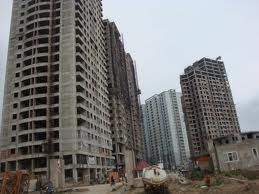Fund to open the door to housing
 Nguyen Manh Ha, head of the ministry’s (MoC) Housing and Real Estate Market Management Bureau, said the fund would be established to meet house hunters’ demands and be based on their capital needs. The fund will create a safety loan for people to buy house, instead of fully depending on bankers as currently.
Nguyen Manh Ha, head of the ministry’s (MoC) Housing and Real Estate Market Management Bureau, said the fund would be established to meet house hunters’ demands and be based on their capital needs. The fund will create a safety loan for people to buy house, instead of fully depending on bankers as currently.
Under the draft plan, the scheme consists of two models. The first will focus on low-income people in need of budget housing and enterprises in search of capital to build low-cost houses. The second will target middle-income earners. The housing fund will be financed by the existing capital of the housing development fund, contributions from fund participants, the state budget and 30 per cent of lottery profits and housing bond issuances.
The fund’s mobilisation rate will be half of the commercial lending rate, possibly 5 per cent per annum, and the lending rate will be 1 per cent higher than the deposit rate. Ha said the fund participants would make contributions based on their future capital demands.
Specifically, participants will have to contribute an amount equivalent to 30 per cent of the money they want to borrow in the future. After five years, they can access the remaining 70 per cent and pay back the fund over 10 years with fixed interest rates. The fund was originally planned to follow the social insurance model, requiring participants to contribute 1 per cent of their monthly incomes to the fund.
The fund would offer loans with fixed interest rates despite bank lending volatility to facilitate people’s access to capital, Ha said. The Vietnamese market was suffering from a serious shortage of investment capital and developers and investors needed to look beyond bankers when it came to sourcing new cash, Ha said.
Ha admitted that the fund, together with real estate investment trusts (REITs), would be most suitable ways for mobilising market capital. Nguyen Tran Nam, deputy MoC minister, said there were nine million workers who received salaries and every year this fund would receive VND10,000 billion ($480 million) if they contributed 1 per cent of their monthly salaries to the fund.
“This would be a remarkable figure to develop housing in Vietnam. The fund would also be a bridge to help poor people have an opportunity to buy housing,” Nam said.
Moreover, people who did not wish to buy a house could withdraw contributions and benefit when they retired, Nam said. According to MoC figures, in urban areas there were more than seven million people needing to lease or rent accommodation.
What the stars mean:
★ Poor ★ ★ Promising ★★★ Good ★★★★ Very good ★★★★★ Exceptional
Related Contents
Latest News
More News
- An Phat 5 Industrial Park targets ESG-driven investors in Hai Phong (January 26, 2026 | 08:30)
- Decree opens incentives for green urban development (January 24, 2026 | 11:18)
- Public investment is reshaping real estate’s role in Vietnam (January 21, 2026 | 10:04)
- Ho Chi Minh City seeks investor to revive Binh Quoi–Thanh Da project (January 19, 2026 | 11:58)
- Sun Group launches construction of Rach Chiec sports complex (January 16, 2026 | 16:17)
- CEO Group breaks ground on first industrial park in Haiphong Free Trade Zone (January 15, 2026 | 15:47)
- BRIGHTPARK Entertainment Complex opens in Ninh Binh (January 12, 2026 | 14:27)
- Ho Chi Minh City's industrial parks top $5.3 billion investment in 2025 (January 06, 2026 | 08:38)
- Why Vietnam must build a global strategy for its construction industry (December 31, 2025 | 18:57)
- Housing operations must be effective (December 29, 2025 | 10:00)

 Tag:
Tag:



















 Mobile Version
Mobile Version